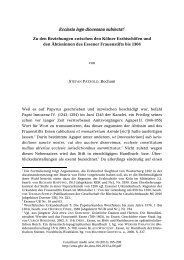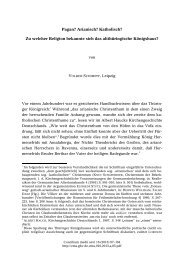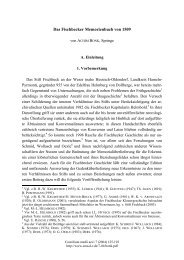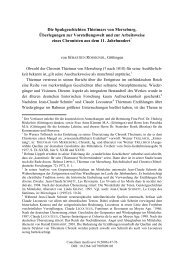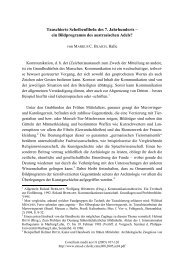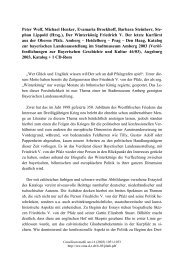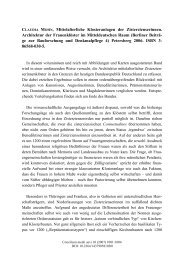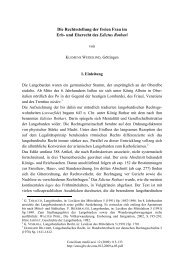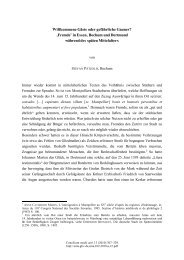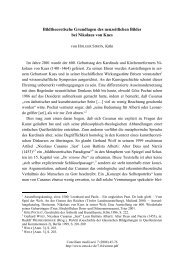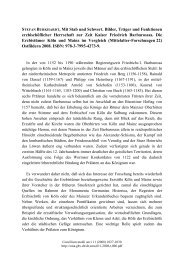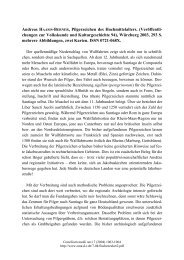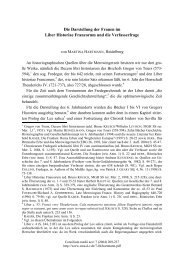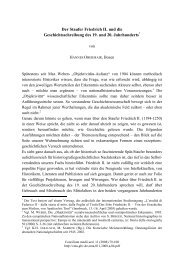Rabanus Maurus - Concilium medii aevi
Rabanus Maurus - Concilium medii aevi
Rabanus Maurus - Concilium medii aevi
Create successful ePaper yourself
Turn your PDF publications into a flip-book with our unique Google optimized e-Paper software.
FEE-ALEXANDRA HAASE: Rhetoric as praise of the emperor<br />
no equal. Rhabanus was thoroughly conversant with canon law and liturgy. Rhabanus’<br />
literary activity extended over the entire field of sacred and profane learning as then<br />
understood. Rhabanus followed in the beaten track of his learned predecessors. 33 Also<br />
other scholars of the Carolingian empire took part in the educational concept of<br />
Charlemagne. Modoinus (ca. 770-840/43) praises in his Ecloga ad Karolum (Prologus<br />
Liber prior Liber posterior Epilogus) the emperor:<br />
Caesareis, Karolus sapiens, hec auribus hauri<br />
Carmina, que nulla sunt peritura die,<br />
Dum rapidis sol currit equis, vibramine terras<br />
Inlustrat, gelidis dum mare fervet aquis,<br />
Epistola Theodulfi ad Modoinum. 34<br />
In the Rescriptum Modoini ad Theodulfum it is mentioned that no one can play,<br />
speak or care about the art correctly without right:<br />
Modoinus indignus episcopus Theodulfo suo.<br />
Ludere nemo potest versu sine lege polito,<br />
Nempe loqui recte nec valet arte carens.<br />
Sed prius accipiter nec temptat vivere in armis,<br />
Quam instructus proprii hoc more parentis agat. 35<br />
Most of Rhabanus’ works have been edited by Colvenerius in Cologne in 1627. His<br />
chief pedagogical works are De universo, a sort of encyclopaedia in 22 books, based<br />
on the Etymologies of Isidore, De computo, a treatise on reckoning and the Excerptio<br />
de arte grammatica Prisciani, a treatise on grammar. Other important works are De<br />
ecclesiastics discipline, sermons, treatises, a martyrology, and a penitential. The<br />
tradition of advising in rhetoric came traditionally from the relation father to son and<br />
later on developed into the broader relation of teacher and student, which was adapted<br />
by Alcuin. Later, Albertanus of Brescia writes in his trease to the son entitled loquendi<br />
et tacendi six questions used as conditions for speech:<br />
[...] sed linguam nemo domare potest: ideo ego, Albertanus, brevem doctrinam<br />
33 Raymund KOTTJE, Hrabanus <strong>Maurus</strong> – “Praeceptor Germaniae”?, in: Deutsches Archiv für<br />
Erforschung des Mittelalters 31 (1975) Pp. 534-545.<br />
34 http://www.fh-augsburg.de/~harsch/Chronologia/Lspost09/Modoinus/mod_intr.html. [7.7.2004]<br />
35 http://www.fh-augsburg.de/~harsch/Chronologia/Lspost09/Modoinus/mod_resc.html. [7.7.2004]<br />
Text in: MGH Poet. I, pp. 569-73 ed. Ernst DÜMMLER. 1881.<br />
19



